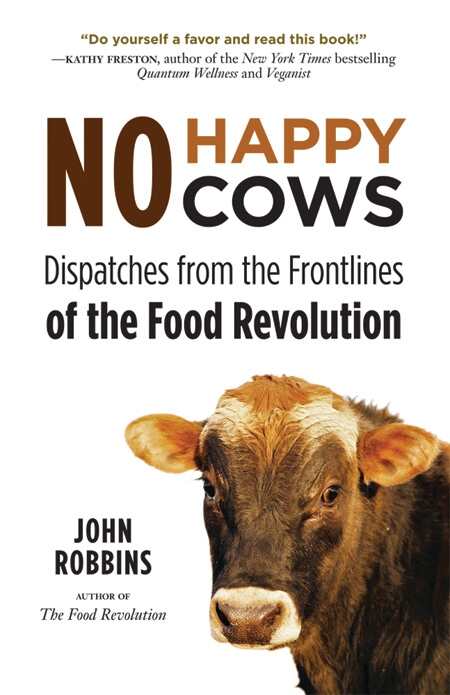No Happy Cows
Dispatches from the Frontlines of the Food Revolution
John Robbins, author of the Pulitzer Prize-nominated Diet for a New America and The Food Revolution, has been a passionate advocate for a plant-based diet for many years. Heir to the Baskin-Robbins fortune, he chose a different path, focusing instead on exposing bad practices in the meat and dairy industries and the implications for our well-being.
In No Happy Cows, a collection of essays from his blog for the Huffington Post and his website, Robbins again looks at the nation’s modern factory farms that he considers detrimental to the animals, the environment, and our own health.
The title essay, “No Happy Cows,” references a California Milk Advisory Board ad campaign that depicts the state’s dairy cows grazing freely and enjoying peaceful lives on lush, grassy pastures. Nothing could be further from the truth, Robbins reveals, with most cows living in crowded, filthy feedlots and regularly fed antibiotics and bovine growth hormones. He tells similarly harrowing tales from the pork, beef, and poultry industries, and he notes related health issues, including salmonella risks tied to egg production, hormones in our milk, and virulent strains of bacteria resulting from widespread use of antibiotics in meat production.
This could be pretty bleak stuff, but Robbins handles these difficult issues with a light touch and a sense of compassion. While sensitive to the animals’ suffering, he shows a similar empathy for the people whose lives and livelihoods are tied to these industries. In a moving essay, he describes a pig farmer who seems gruff and distant until confessing his deep sadness at the factory farm practices he feels are necessary to compete with efficient corporate operations and to support his family. But the story offers a glimmer of hope as the pig farmer transforms his life. He sells his operation in Iowa, buys a small farm in Missouri, starts raising organic produce, sustains his family, and improves his health. This story resonates with Robbins, undoubtedly because in part it parallels his own courageous choices.
Robbins also finds hope in those who reduce or eliminate meat from their diets. While urging caution on genetically engineered foods, Robbins sees soy as a viable alternative protein source and addresses numerous misperceptions about it. He also touches on public policy, including the nation’s “out-of-control” health care costs resulting from preventable conditions tied to our food choices. This book may or may not convert all readers, but it will certainly raise awareness of the benefits of a plant-based diet—to the planet, to the animals, and to our physical and emotional health.
Reviewed by
Kristen Rabe
Disclosure: This article is not an endorsement, but a review. The publisher of this book provided free copies of the book to have their book reviewed by a professional reviewer. No fee was paid by the publisher for this review. Foreword Reviews only recommends books that we love. Foreword Magazine, Inc. is disclosing this in accordance with the Federal Trade Commission’s 16 CFR, Part 255.

